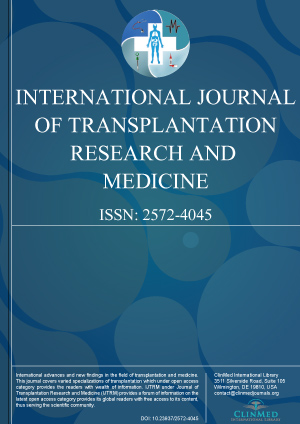Open Access DOI:10.23937/2572-4045.1510053
Challenges in Organ Donation during COVID-19 Pandemic: A Singapore Perspective
Jennifer Ting and Wong YL
Article Type: Case Report | First Published: August 19, 2020
The clinical course of Coronavirus disease 2019 (covid-19) in lung transplant recipients remains unknown. We present the fatal clinical course of a 63-year-old double lung transplant recipient with severe Covid-19 pneumonia. She had stable graft function before Covid-19 infection. Despite all the supportive care and treatment graft injury progressed, causing patient death. Therefore, the prognosis in lung transplant recipients with Covid-19 infection is not optimistic. The determination of brain...
Open Access DOI:10.23937/2572-4045.1510052
Covid-19 Pneumonia in Bilateral Lung Transplant Recipient: Case Report
Juan Pablo Reig Mezquida, MD, Alilis Fontana Bellorín, MD, Alberto Garcia Ortega, MD and Gabriel Anguera de Francisco, MD
Article Type: Case Report | First Published: May 18, 2020
The clinical course of Coronavirus disease 2019 (covid-19) in lung transplant recipients remains unknown. We present the fatal clinical course of a 63-year-old double lung transplant recipient with severe Covid-19 pneumonia. She had stable graft function before Covid-19 infection. Despite all the supportive care and treatment graft injury progressed, causing patient death. Therefore, the prognosis in lung transplant recipients with Covid-19 infection is not optimistic....
Open Access DOI:10.23937/2572-4045.1510050
Thromboelastogram Demonstrates Significant Hypercoagulability in Patients Undergoing Right Donor Hepatectomy - A Prospective Single-Center Analysis
Anupam Raj, DNB, Vijay Shankar, MD, Saurabh Singhal, MS, Purnima Dhar, MD, Lalitha Krishnan, FRCA, Neerav Goyal, DNB and V Arunkumar, MCH
Article Type: Original Research | First Published: April 15, 2020
Unavailability of deceased donors in the east has led to a rise in the popularity of living donor liver transplantation (LDLT). Preventing postoperative complications is a major concern in LDLT’s. There are reports of fatal pulmonary embolism which has happened in Living Donors. Moreover, a study examining thromboelastogram (TEG) patterns in 10 liver donors in 2004 showed a significant development of hypercoagulability in 6 patients. We attempted to analyze the coagulation status of living don...
Open Access DOI:10.23937/2572-4045.1510049
Safety and Allograft Function Post Native Lung Pneumonectomy, A Single Lung Transplant Center Experience
Victoria Rusanov, Osnat Shtraichman, Milton Saute, Yuri Peysakhovich, Dror Rosengarten and Mordechai R Kramer
Article Type: Research Article | First Published: April 11, 2020
Single lung transplantation is a valuable treatment option for end stage lung disease cases of which bilateral lung transplantation is not necessarily indicated. The main disadvantage of single lung transplantation is complications related to the native lung. The most common complications are infection and malignancy which tend to behave aggressively and often require surgical intervention. Safety and feasibility of surgery in lung transplant recipients has been shown in several case reports, ho...
Open Access DOI:10.23937/2572-4045.1510048
Is Pregnancy Safe for Kidney Transplant Recipients With Chronic Hepatitis C Virus (HCV) İnfection? An Updated Review
Ethem Unal, Abdullah Yildiz, Sema Yuksekdag, Aysun Firat and Nevin Yilmaz
Article Type: Mini Review | First Published: March 19, 2020
Ovarian function with regular menstrual cycles is usually restored in women of reproductive age after solid organ transplantation. The number of pregnancies reported in these patients increases gradually. Pregnancy is always considered high risk, and if not properly planned, may lead to serious complications. The best for the patient is to conceive in a period of good general health and good stable graft function, after appropriate preparation. However, hepatitis C virus (HCV) infection will be ...
Open Access DOI:10.23937/2572-4045.1510047
Candida Retinitis in a Liver Transplantation Recipient
Kose A
Article Type: Case Report | First Published: March 13, 2020
A 52-year-old male patient had been undergone right lobe LT from a living donor. He had diabetes mellitus and underwent serial erythrocyte and thrombocyte transfusions, the score of models for end-stage liver disease (MELD) was 23. On the 14th day, biliary leakage and infected bilioma determined in multislice abdominal tomography. On the 25th day, sepsis symptoms such as fever, tachycardia and hypotension developed. Leukocytosis, elevated C-reactive protein (CRP) and procalcitonin were also pres...
Open Access DOI:10.23937/2572-4045.1510046
Dual Induction Therapy after Pediatric Kidney Transplantation in a Multiracial Cohort: A Single Center Experience
Mariselis Rosa Sanchez, MD, Marissa J Defreitas, MD, Chryso P Katsoufis, MD, Wacharee Seeherunvong, MD, Linda Chen, MD, Carolyn L Abitbol, MD, George W Burke III, MD, Gaetano Ciancio, MD and Jayanthi J Chandar, MD
Article Type: Original Article | First Published: March 02, 2020
Induction antibody immunosuppressive protocols in children have been extrapolated from experience gained primarily from kidney transplantation in adults and are center- specific. There is a paucity of information on the clinical and immunological effects of these protocols in children. Retrospective chart review was performed in all pediatric kidney transplant recipients less than 21 years of age at the Miami Transplant Institute during the period of January 2012 to June 2015. Relevant demograph...

